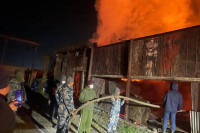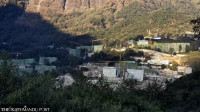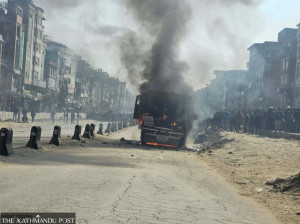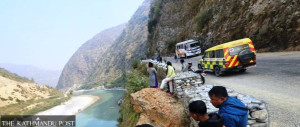Bagmati Province
Travails of the orphaned, landless and stateless
Ramrati Tharu, elderly and frail, is denied her elderly allowance because she lacks citizenship. Several others in Madi share her plight.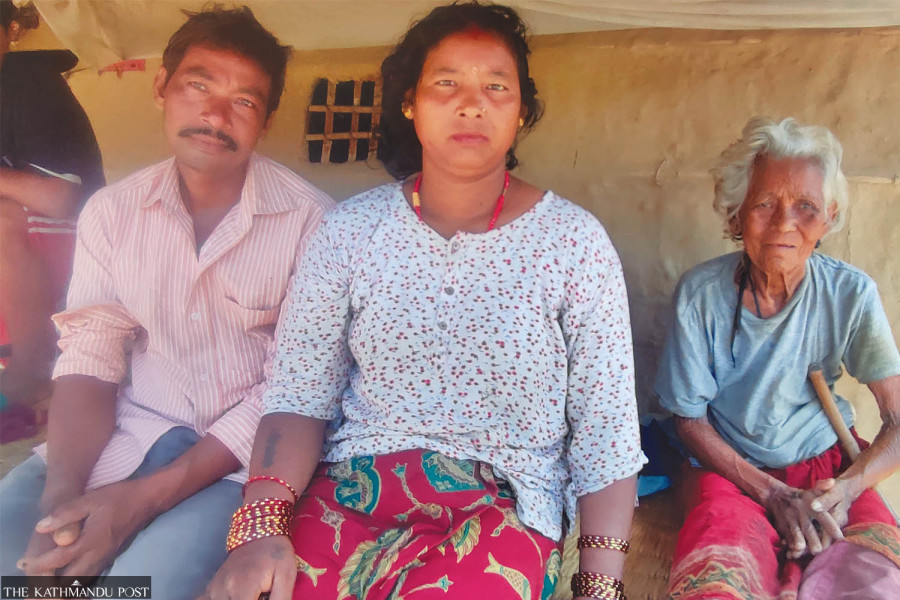
Ramesh Kumar Paudel
Ramrati Mardaniya Tharu does not know her exact age, but with her wrinkled face, grey hair, and poor vision, she appears to be in her seventies, if not eighties. She is frail, often complains of body aches and sleeplessness, and despite her age, she is missing out on the elderly allowance meant for those over 68 because she does not have a citizenship certificate.
Ramrati lives with her son’s family in one of the ten makeshift huts erected on public land near the Bandarmudhe stream in ward 6 of Madi Municipality in Chitwan district. Her thatched-roof hut leaks during the rainy season and is at risk of flooding and snakebites as it lies near a stream.
Ramrati built the hut on public land behind the property belonging to Arjun Bahadur Gurung and his two brothers some five years ago. She does not have any hope of acquiring a land ownership certificate, but desperately needs a citizenship certificate to claim the social security allowance.
“If I had a citizenship certificate, I could get the elderly allowance. It would help buy medicines and a sack of rice,” said Ramrati with a sigh.
Ramrati was married to Thagai, who died a few years ago. They lived in Padampur of Chitwan without owning any land. They worked on others’ fields to make ends meet. Ramrati had already lost her parents when she married. According to Ramrati, her husband Thagai had acquired citizenship in 1972 and he had tried to get citizenship for Ramrati, but could not.
“The officials demanded my parents’ citizenship, but I was orphaned as a child. How can I produce their citizenship certificates?” Ramrati explained. She never felt the need for citizenship in the past as she and her husband lived as landless squatters moving here and there.
“There is no other use for citizenship for my mother. It is only needed for the elderly allowance which would help cover food and medical costs,” said Rameshwar, Ramrati’s 50-year-old son.
Rameshwar’s wife Sunita also does not have a citizenship certificate. “I was working at a hotel in Tribeni of Nawalparasi in 1996 when I met her (Sunita). She was an orphan, and I felt sorry for her, so I married her,” he said. Now, Sunita faces the same plight of statelessness as Ramrati.
According to Dipendra Paudel, chairman of ward 6 of Madi Municipality, the ward office can recommend citizenship by descent if there is evidence that the woman’s parents had citizenship by descent. And for a foreign woman married to a Nepali man, proof of renouncing her previous citizenship is needed to obtain naturalised citizenship.

“We cannot recommend a citizenship certificate for a married woman without these documents,” said Paudel. According to him, there are around 15 people, mostly women, in the ward who cannot produce the required documents to apply for citizenship.
Janui Mahato of Madi-6 shares a similar ordeal. She was born around 50 years ago. Her parents used to stay in a hut built on public land near the Rauteni river. Her father died a few years after her birth. And her mother also died before she was old enough to remember her. Junai later married Dilli Mahato of Amrauli village in the same ward. Her husband and three children have citizenship, but she is without one.
“The authorities keep asking for my parents’ citizenship documents. I don’t even know whether they had citizenship or not. Now, neither I, nor my brother can obtain citizenship,” said Janui.
In the Madi area, there are several settlements set up on public land. Besides citizenship issues, these landless people endure several problems like lack of drinking water and electricity.
There are 10 houses in the Pyauli settlement of landless squatters in Madi. “There are four shallow tube wells. But the water is not drinkable. It is so yellow that it leaves stains on clothes when we wash them. We have a serious problem with drinking water,” complained Jiban Darai of Pyauli. According to him, the settlement does not have electricity as well.
“The ward will take initiatives to address the drinking water and electricity problems in some settlements. But we cannot resolve the citizenship issue at our level,” said ward chief Paudel.




 13.12°C Kathmandu
13.12°C Kathmandu1.jpg)




